Government officials from Somalia visited Japan from Nov. 10 to 18 at the invitation of the Ministry of Foreign Affairs and JICA. They included 19 representatives of the recently established federal government of Somalia, the Puntland state government and the Galmudug state government.
In April 2013, the Japanese government decided to restart bilateral assistance to the war-torn country. Somalia, in the Horn of Africa (on the continent's east coast), had no functioning central government for a long time after the government collapsed in 1991.
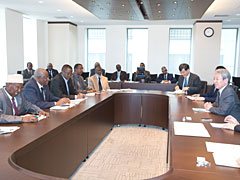
Somali officials exchange opinions with JICA President Akihiko Tanaka, front right, during the conference.
In November 2012, a formal federal government was established after 21 years, and assistance from the international community for country building is moving forward.
Because of a lack of public order and droughts, many refugees and internally displaced persons have been created in Somalia, and the unstable situation has been called a breeding ground for piracy off the coast of Somalia.
During this visit, the officials discussed with Japan International Cooperation Agency (JICA) stakeholders the possibility of future assistance in various areas and deepened their understanding of Japan's ODA principles and techniques. Through observation of efforts to recover from the Great East Japan Earthquake and of public order-related activities of the Japan Coast Guard, they are aiming to leverage the experiences of Japan in post-conflict country building.
A strong interest in earthquake reconstruction and public order activities
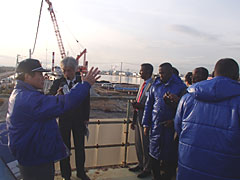
The visitors from Somalia listen to an explanation of the reconstruction status of the Ishinomaki fishing harbor.
On the 13th and 14th, to observe the reconstruction efforts, they visited Ishinomaki City Hall, Japanese Red Cross Ishinomaki Hospital, Sendai Shiogama Port and Ishinomaki fishing port, all in Miyagi Prefecture. Somalia has many natural disasters such as flooding, and because it took damage from the 2004 Indian Ocean earthquake and tsunami, the visitors had a high degree of interest in disaster reconstruction. When they heard explanations of the reconstruction and land reclamation plans at Ishinomaki City Hall, they asked specific questions including "How was the destination for mass relocation decided?" and "How much were the opinions of residents taken into consideration?" They also offered such opinions as "Can't the Japanese Red Cross and the Somali Red Crescent Society (*1) form a partnership to respond to this kind of disaster?"
At Tohoku University's New Industry Creation Hatchery Center, which conducts joint research with Sony Corporation and local industry, they experienced the high level of Japanese research through experiences with electric cars and a driving simulator. The visitors made many comments, such as "Almost all the cars being driven in Somalia are Japanese. It would be great if Japanese automakers would come to Somalia" and "We want Somali students to study at Tohoku University and learn the latest technology."
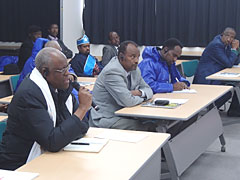
The visitors exchange opinions at Ishinomaki Red Cross Hospital.
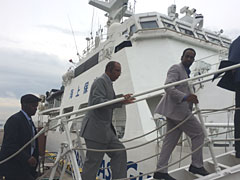
The Somalis visit a patrol ship at the Japan Coast Guard Yokohama Maritime Disaster Prevention Base.
On Nov. 15, they moved to Yokohama city in Kanagawa Prefecture and visited locations including the City of Yokohama's Port & Harbor Bureau. At the Japan Coast Guard Yokohama Maritime Disaster Prevention Base, they heard about rescue and law-enforcement activity, as well as the ships and aircraft there. They then toured the patrol vessel Shikine. In Somalia, where piracy is a problem, public security activity in the coastal region is an important issue as the country prepares for country building. They raised such questions as “How does the Coast Guard respond if it encounters warships or illegal fishing boats?”, “How can the ability of the Somali coast guard be strengthened?” and “Are pirates from off the coast of Somali arrested in Japan?”
They also experienced a water filtration experiment using PET bottles at the Kawai Purification Plant in Yokohama. Many questions were asked, ranging from the specialized to the practical: "How do you decide the proportion of chlorine to put in the water?" "How do you remove the filth that clings to the filtration pond's pebbles and sand?" "I'd like to hear not just about technical matters, but also organizational control, the relationship between local governments and the national government, and about funding sources."
Economics and animal husbandry — untapped potential
On the 16th, they participated in a public symposium called "Somalia: Building the Future,” jointly hosted by JICA, Sophia University and the United Nations High Commissioner for Refugees (UNHCR) at Sophia University in Tokyo. In the keynote address, Jamal Mohamed Barrow, vice minister of the Ministry of Foreign Affairs and International Cooperation, explained how the new government is working to revive the justice system that collapsed because of the civil war.
"To reconstruct social order, we need a reconciliation process that will unify all the classes that make up regional community. For that reason, we have to choose leaders through elections based on democracy. I would like the international community to take a common, consistent stand on the process of peace and reconciliation," he said.
In the following panel discussion, representatives of Somali government circles, researchers from African and Islamic countries, UNHCR Representative in Japan Michael Lindenbauer and JICA personnel discussed Somali reconstruction and assistance from the international community. Mahamud Muse Tarey, planning and policy advisor to the minister of Foreign Affairs and International Cooperation, explained that education and health are at the lowest level in the world in Somalia. Then he said, “The recovery of the Somali people has been quick and they are blessed with an industrious spirit. It is also great to see people who had dispersed to other countries returning."
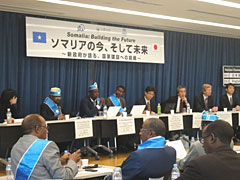
A public symposium: Second from left are Mahamud Muse Tarey, planning and policy advisor to the minister of Foreign Affairs and International Cooperation, Ahmed Hagi Abdullahi, senior advisor to the minister of Finance and National Planning, and Mohamed Ali-Nur Hagi, minister for Planning and International Cooperation in the Galmudug state government.
Ahmed Hagi Abdullahi, senior advisor to the minister of Finance and National Planning, gave a summary of the ministry's economic revitalization plan.
“To put the livelihood of the Somali people back on a secure footing, it is important to maintain the infrastructure, develop industry and otherwise restore the economy," he said.
Mohamed Ali-Nur Hagi, minister for Planning and International Cooperation in the Galmudug state government (*2), said, "Businesses that use mobile phones are being deployed in Somalia. Livestock raising is also booming and we export many goats to the Middle East."
He emphasized that the economy is growing even though the country was in a state of anarchy.
"To make assistance from the international community a reality, a certain level of governance capacity is needed from the Somali government. The question is how it will achieve that level of governance capacity," said Professor Mitsugi Endo of the University of Tokyo graduate school, who is studying African politics.
"One issue is how to overcome tribal consciousness and form national consciousness. The key to stabilization is that unlike in other African countries, the different tribes of Somalia speak the common language of Somali," said Professor Masatoshi Kisaichi of Sophia University, who is studying religious opposition in Islamic countries.
Lindenbauer explained that there are about 200 million refugees inside and outside of Somalia, and said, "There are some bright spots, such as the fact that some are voluntarily returning."
Focusing on human resource development and capacity building
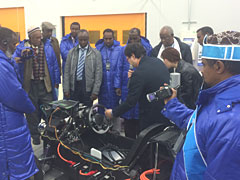
The visitors hear about electric cars at Tohoku University's New Industry Creation Hatchery Center.
Looking back on his visit to Japan, Tarey said, "I learned how Japanese people helped one another amid shortages of various items during the disaster. I was impressed by the fact that they are doing community planning based on lessons from the tsunami and earthquake."
Abdiwahid Mohamed Hirsi, director general of the Ministry of Fishery in the Puntland state government, said, "I learned a lot from seeing people and government do recovery work hand in hand. I would like to put what I learned in Japan into practice after I return to Somalia."
Also, minister Hagi promised to achieve peace, saying, "There is neither a Japanese Embassy nor a JICA office in Somalia, but I look forward to seeing all of you from Japan in Somalia."
At the fifth Tokyo International Conference on African Development (TICAD V) in June 2013, The President Hassan Sheikh Mohamud from the federal government of Somalia told JICA President Akihiko Tanaka a story about how a friend of the president participated in JICA training held before the government collapsed in 1990. He also expressed thanks for the support from Japan to Somalia that lasted many years.
In the future, JICA plans to restart training in Japan centered on improving public safety measures and basic social services, as well as on activating domestic industry, among other things. At the same time, it will work to expand ongoing third-country training.
(*1)Because the cross is associated with Christianity, in Islamic countries, the Red Cross uses the name Red Crescent for its organization, as well as the red crescent symbol.
(*2)The government of Somalia has a federal system, in addition to which there is a government in each state.




scroll